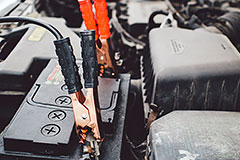How to Check If a Battery Is Dying - Vol.338
Picture this: you're running a little bit late one morning, finally out the door and in the car. You can still make it to work on time if you don't hit bad traffic on the way. You twist the key in the ignition, and...nothing. A few clicks is all you get and you realize that you must have left your headlights on overnight because your battery is dead.
Dreadful scenarios like these can be avoided, but it takes a little extra vigilance. Car batteries can be a pain to deal with, but it's better to take preventative measures than risk being stranded. If there is nobody around to give you a jump-start, you might be waiting around a while or paying a lot of money to fix a preventable issue.

The Basics
A good car battery can last about 4-5 years. When purchasing a new one, it's important to make sure the battery you're buying is less than a month old. If it's been sitting in the shop too long, it could already be worn. If your battery is at least 3 years old by the time it's showing signs of weakness, it's likely in the window of needing to be replaced. Make sure you're aware of any warranty you might have on your battery when troubleshooting, as this can change how willing you might be to get a replacement early.
If your car is having trouble cold-cranking (starting for the first time in a day), perhaps 3 or more times a week, then it is likely that your battery is dying. If you've had to jump-start your battery multiple times in the last month or so, this could also be a sign. Also keep in mind that many problems that seem to be battery-related could actually be from a damaged alternator. Be prepared for the occasion that this is actually causing the problem. Everyone has a sensitive 'check engine' light, but for the most part your car will try to tell you if there's a problem and you should try to listen.
Step 1: Take a gander
Sometimes, the cause for battery problems will be visible to the naked eye. It never hurts to start with taking a quick inspection of your battery to check for any signs that it is compromised. Maybe it has a broken terminal or the case is bulging (from being overcharged), cracked (from being mishandled), or you notice discoloration. If you see any burning or melting, it could be a sign that there was a short-circuit, which are often caused by a dislodged terminal.
If you're using a wet-cell (flooded) battery, check the fluid. If it is low, add more. If it is dark or discolored, the battery is bad and needs to be replaced. If you've been running with low or no fluid in the battery, this can cause it to rapid buildup of sulfation which will destroy your battery. Be mindful of these things and check on them often.
If your battery looks fine or you're just not sure, it's time to try the next step:
Step 2: Check the voltage
It's always good to have a voltmeter or power probe on hand in your car, just in case you ever need to check the battery. A good battery should read between 12.4-12.7 volts. Between 12v-12.3v and your battery is low. If you're reading less than 12v, your battery is depleted. If you read less than 9.6v on a power probe while cranking the engine, it's likely that your battery is sulfated and will not hold a charge.
Step 3: Ask a professional
When all else fails, it's time to turn to the experts! An auto mechanic can inspect your battery's exterior with a trained eye, perform a more quantitative load test, and more effectively diagnose the problem. If you're in over your head, don't be afraid to find someone that knows their stuff and can handle this for you. It can be expensive, but it's always worth it to know for sure and to have options. Working too much with car batteries without the proper experience can be dangerous and mechanics are ready to take care of it.
Ask them if you need to replace the battery, how much it will cost, if the alternator is damaged at all, and what steps you can take to maintain your type of battery for your car in the long term. They can give you tips on how to keep those expensive visits to a minimum.